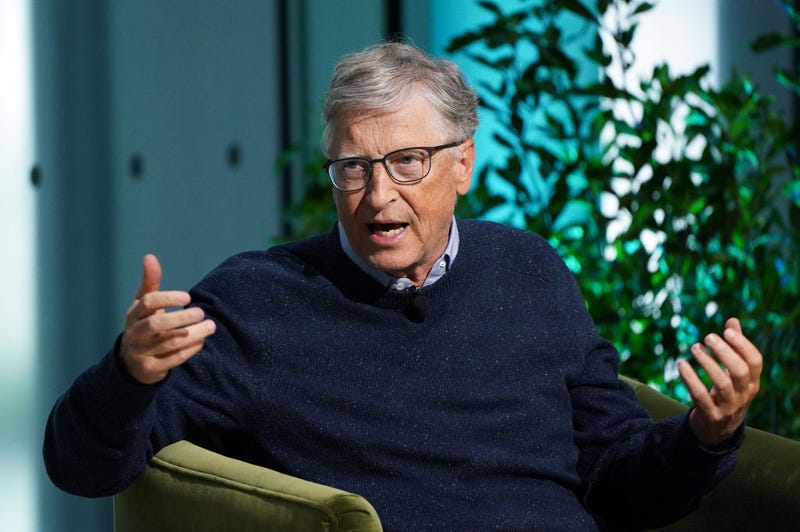
Bill Gates, billionaire entrepreneur and co-founder of Microsoft, thinks a big change is coming in the next five years. He thinks we’ll all basically have robot assistants.
When we talked about this in our (virtual) newsroom, we hoped that they would at least be cute robot assistants – more like a golden retriever than the title character of “M3GAN”. According to Gates, they’ll probably be a bit more like HAL 9000 from “2001 A Space Odyssey”.
“How will you interact with your agent? Companies are exploring various options including apps, glasses, pendants, pins, and even holograms,” said Gates in a recent blog post. “All of these are possibilities, but I think the first big breakthrough in human-agent interaction will be earbuds. If your agent needs to check in with you, it will speak to you or show up on your phone.”
Gates admitted that he thinks today’s software is “still petty dumb,” but that changes are coming fast. These changes are centered around the recent growth in artificial intelligence research and technology innovation.
Within two months of its public release, the Chat GPT AI writing program already had 100 million users, Audacy reported in February.
“Global revenue associated with AI software, hardware, service and sales will likely grow at 19% per year, reaching $900 billion by 2026, compared with $318 billion in 2020,” said Bank of America. “According to some estimates, AI will contribute more than $15 trillion to the global economy by 2030.”
Gates referred to the robot assistant concept as an “agent” that responds to natural language and has a “rich understanding of your life” that it uses to complete tasks. This concept is something that he’s been writing about since 1995.
“Agents are not only going to change how everyone interacts with computers,” said Gates in his blog post. “They’re also going to upend the software industry, bringing about the biggest revolution in computing since we went from typing commands to tapping on icons.”
He explained that users will be able to have nuanced conversations with these agents and that they’ll be able to help with a wide range of projects. Some tasks Gates mentioned were travel plans, tutoring and education, mental healthcare resources, creative endeavors, advertising, social media posting, website creation and more.
“In the computing industry, we talk about platforms – the technologies that apps and services are built on,” he said. “Android, iOS, and Windows are all platforms. Agents will be the next platform.”
However, Gates noted that there are critics of what he sees as the incoming wave of “agents” taking over tech. He even addressed the Clippy, the Microsoft digital assistant that’s been the butt of jokes and subject of memes.
“Clippy has as much in common with agents as a rotary phone has with a mobile device,” Gates said.
Another issue is privacy. In order for agents to develop that nuanced understanding of users, they will require permission to collect data about their online and real-world activities. Gates acknowledged that, for example, keeping data about therapy sessions separate from data about tutoring sessions would be important. Making sure that data doesn’t end up in a work email is important too. Gates said it still isn’t clear what the data structure of agents will look like.
“The most exciting impact of AI agents is the way they will democratize services that today are too expensive for most people,” said Gates.
“They’ll have an especially big influence in four areas: health care, education, productivity, and entertainment and shopping.”
He said that “in the distant future” humans may have to face profound questions about their purpose in the face of advanced agent technology and that they will likely have more free time. However, despite the billionaire’s claims about democratization of services and leisure time, at least one expert thinks the rise of AI is going to have a quicker, tougher impact on the economy for some.
“I think it's going to create a demand for different skills. AI is very much like a black box. By that, I mean even the people who create it don’t understand exactly how it’s functioning. So at least some people have speculated that managing an AI may require more linguistic humanities skills than mathematical skills, said Joseph E. Stiglitz – a winner of the 2001 Nobel Prize in economics, a professor at Columbia University, and chief economist at the Roosevelt Institute, a think tank based in New York City – in an interview with Scientific American. “And it may create a change in the kinds of skills that are valuable in the labor market. I see it as, at least in many areas, increasing productivity enough that the demand for labor in those areas will go down. There will be jobs created, but my judgment is that there will be more jobs lost.”
While Gates said that the recent investment in AI indicates that agent technology will be inexpensive soon, a study published last month by Bank for International Settlements found that “investment in AI is associated with higher income inequality.”
Gates is also concerned about hallucinations, agent bias and agents doing things they are not supposed to do. Earlier this year, Audacy reported on an AI program inspired by the sitcom “Seinfeld” that had to be removed after a character went on a homophobic rant.
“Today, you can show someone that you care about them by remembering details about their life—say, their birthday,” said Gates, addressing another concern related to the agents. “But when they know your agent likely reminded you about it and took care of sending flowers, will it be as meaningful for them?”
Follow KNX News 97.1 FM
Twitter | Facebook | Instagram | TikTok
